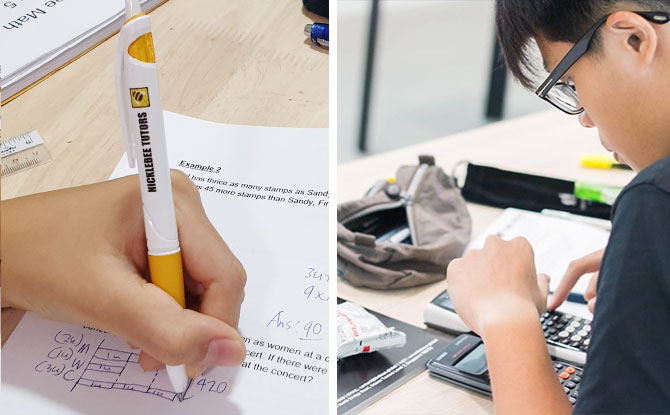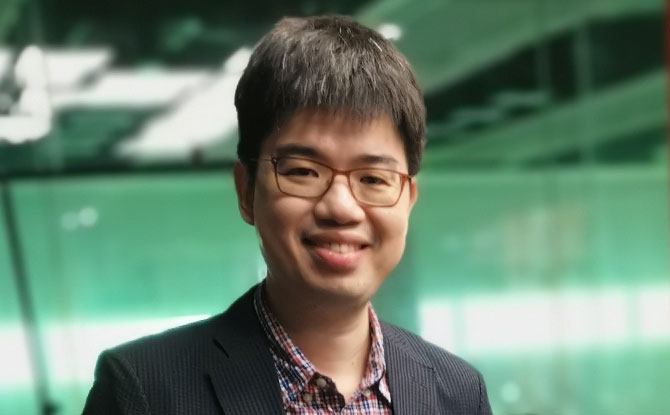
Nearly every year, difficult PSLE Math questions spark a furore among students and parents.
In 2019, the infamous semi-circle question left many students in tears. In 2021, it was a question about Henry, Ivan and their coins that stumped examinees and made its rounds on the internet.
It seems that, in recent years, Math Olympiad-style questions have been appearing in PSLE Math papers with increasing frequency.
However, the Ministry of Education maintains that the difficulty level of the PSLE has been kept consistent, with challenging questions capped at 15% yearly.
CARNIVAL OF CHRISTMAS CHEER: Celebrate and Win at Plantation Plaza and Northshore Plaza!
SNOW MUCH TO CELEBRATE: Christmas Fun at The Centrepoint
One thing is clear: the PSLE Math paper is not going to get easier.
How can students be better prepared for it and approach it with the correct mindset?
We get expert advice from Mr Zhou Shicai, founder of top-rated Math education centre, NickleBee Tutors. Mr Zhou is a multiple Math Olympiad gold medallist and Gifted Education Programme alumnus.
Are the challenging questions in the PSLE Math paper really that tough?
Many parents have been asking if it is fair to have very challenging questions in the PSLE Math paper.
Mr Zhou is of the opinion that the examination is designed to have a good mix of fundamental, average and challenging questions – all within the scope of the Primary Math syllabus.
Difficult questions exist to provide all students – not just those who are deemed bright – with the chance to do their best at applying the Math problem-solving techniques and heuristics that they were taught in school.
“As an educator, I have observed that different students have different strengths in various areas of Math,” Mr Zhou shares.
“I have had very bright students stumble over the more complicated pattern questions because pattern recognition is just not their forte. I have also taught some students who struggle with percentage problem sums, but do very well in complicated 3-D figure drawings and spatial visualisation type questions.”
As can be seen, how tough questions are is relative.
What should students do when facing difficulty answering a question?
A common worry among parents is that children may feel defeated when they cannot solve a question from the get-go, which could affect their performance for the whole paper.
In the pep talk that Mr Zhou gives to his students before the PSLE, he urges them to “remain calm and be confident of their own mathematical abilities and problem-solving skills” – even if they get surprised by some of the unconventional or demanding questions in the paper.
“I remind each batch of Primary 6 students that the PSLE paper is never designed to be easy or difficult,” Mr Zhou says. To him, every year’s examination is “manageable and straightforward if the student remains calm and focused”.
“No matter what,” Mr Zhou emphasises, “they should never give up!”
When students find it hard to solve a question, they should read it again to try to decipher the meaningful relationships between the words and numbers. Mentally acting out the story depicted in the question can help them to understand it better too.
Mr Zhou also suggests thinking of the various heuristics or techniques that they have learnt, to find one that works for this particular case.
“In fact, some of the challenging problems in Paper 2 are now broken into Part A and Part B,” Mr Zhou informs.
“The students’ thought process is guided to solve the intermediate step in the first part of the question, which will then lead them to the final answer in the second part.”
His advice for students who are stuck on a question for more than five minutes? Circle the question number, skip the question and come back to it later.
Most importantly, never leave any question blank! According to Mr Zhou, as long as “systematic and relevant workings have been provided” to attempt to solve it, “MOE markers will award method marks where appropriate”.
Why is the Math paper always a point of contention during the PSLE?
We don’t hear of open letters being written to the Education Minister on the difficulty level of a PSLE English paper, or come across memes about a tough PSLE Chinese question. Why does it seem that only the Math paper in the PSLE sparks controversy?
Having had 10 years’ experience in running an education centre that specialises in Math, Mr Zhou’s understanding is that some parents have the perception that Math is the only subject for which students can score close to 100%. As such, they may have higher expectations for their children’s Math results.
“Unlike languages or Science, where there can be multiple acceptable answers, explanations or composition formats,” Mr Zhou posits, “most Math questions have only two answers: the right answer and the wrong answer, leading to parents and students having a quick way of assessing how they did for the exams by comparing answers with each other.”
How can students prepare for Math Olympiad-style questions, which seem to be appearing more frequently in PSLE Math papers?
While all topics tested in the PSLE Math paper fall within the scope of the Primary Math syllabus, the way that some of the questions are phrased may seem more non-routine, sometimes similar to the style of the Math Olympiad.
To help sharpen children’s ability to solve these questions, parents can opt to let them undertake the study of PSLE Math at a higher level.
NickleBee Tutors’ Advanced PSLE Math Masterclass
At NickleBee Tutors, an Advanced PSLE Math Masterclass has been set up to help students stretch their potential. This class saw 93% of its students scoring AL1 in PSLE Math in 2022!
The school uses their proprietary C3PO™ Problem Solving Framework and UNITARY™ Method, which have given students the confidence and speed to solve difficult problem sums efficiently and accurately.
In addition to the core P5 and P6 PSLE Math MOE curriculum, students also get to explore introductory GEP Math and Olympiad Math components such as investigative Math, non-routine questions, higher-order thinking skills, creative problem-solving techniques and advanced heuristic tools.
The class is taught by Mr Zhou and is a 12-month course that starts on the first week of October each year and ends just before the PSLE Math Paper the following year.
NickleBee Tutors’ Advanced PSLE Math Masterclass will be conducted in Bishan, Bukit Timah and Sengkang for students taking the PSLE in Academic Year 2024.
Find out more about NickleBee Tutors’ Advanced PSLE Math Masterclass.
Grades do not define a child
At the end of the day, students who have done their best in preparing for the PSLE Math paper should be proud of themselves, whatever the results.
As Mr Zhou says, “While grades do reflect their understanding of the subject matter, they most definitely do not define a child’s value or individuality.”
Let’s celebrate effort first. A good PSLE Math grade will be the icing on the cake.
This feature is brought to you by NickleBee Tutors.


























